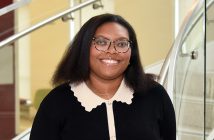As a corporate litigator and the first woman elected to Milbank LLP’s five-member Global Executive Committee, Stacey J. Rappaport is as tough as they come. But what truly drives her is helping other women, whether they’re colleagues on the way up or those who are utterly powerless.
Ask Stacey Rappaport if it was intimidating for her, as a woman, to land a high-powered corporate law job in the ’90s, and she laughs. “After transferring from engineering school? I was undaunted.”
Still, while law might have seemed less daunting and more female-friendly than a career in engineering, Rappaport—a partner in Milbank’s Litigation & Arbitration Group in New York City—would eventually discover that making partner at a major law firm, as Rappaport did in 2004 at age 33, had its challenges.
Though three out of the seven new partners that year were women, a respectable percentage, when Rappaport walked into her first partners’ meeting, “It was the first time I honestly felt different. I felt alone,” says Rappaport, who was recently named to the 2019 Notable Women in Law list in Crain’s New York Business.
That loneliness took Rappaport by surprise. As an associate, she explains, “I had enough female peers around me to feel that I had a cohort. But suddenly, I [was] the youngest female on the bottom rung in this sea of very experienced male lawyers.” On top of that, at the time, Rappaport was the only female partner in her New York litigation group (now there are five of them). “I wondered, ‘How do I fit in here? How do I negotiate this new work dynamic? And who am I supposed to ask?’”
A mentor and a role model
Questions like these led Rappaport to begin seeking a broader network of women partners and mentoring other women as she moved forward in her work defending major corporations and handling complex litigation for the country’s largest insurance companies. “Stacey has been invested in my success from the time I joined the firm,” says Atara Miller, who became a partner at Milbank in 2012. “She pushed me to extend myself, and gave me the guidance, feedback, and support that empowered me to succeed.”
Rappaport had her introduction to official leadership as president of a sorority at Cornell University. “You learn to be a leader when you have to make tough decisions that cause conflict with your friends but are best for the organization. You learn to run this small business—from negotiating contracts to sticking to a budget to organizing recruiting parties. Some may minimize the [sorority] experience, but it taught me a lot,” she says.
At Cornell, Rappaport first majored in engineering, then switched to business, intending to go to graduate school for her MBA. Then a business law class sparked her interest in law school. “I thought it was a perfect marriage of my excitement about the business world with my other skills—oral communication and writing and analyzing—all the things that come with making a good argument,” she explains.
Once at Fordham Law, Rappaport especially relished her year-long clinical program, where she assisted a professor who accomplished that rare thing: getting an innocent man released from a wrongful criminal sentence. “Being able to help bring true justice to someone—those memories are burned in my mind,” she says.
Rappaport carried that desire to see justice done into her career at Milbank and beyond; she is now on the board of Lincoln Square Legal Services Inc., which operates Fordham Law’s clinic. “I’m really proud to give back,” she says.
A life-changing course
Until 2013, when she was elected to Milbank’s Compensation Committee, Rappaport was also chair of Milbank’s Women’s Initiative, which she and several women partners launched in 2009. “We decided we needed to support each other,” she says. “It was a way to create my own network with people who were similarly situated.” The next year, Rappaport participated in the Hastings Leadership Academy for Women at the University of California, a program for female law partners that she calls career-changing. At Hastings, Rappaport says she learned how to market to male clients “without leaving the impression that there was an ulterior motive other than business.” She also learned the importance of building a strategic network (and what, exactly, a strategic network was). “Nobody ever teaches these things!” she says.
The Hastings program was so transformational that Rappaport now sits on the advisory board of the Center for WorkLife Law, which runs the program. Her firm has sent a female partner nearly every year. “[Hastings] freed me up,” says Rappaport, who made a conscious effort to bring back what she learned to the Women’s Initiative at Milbank. “Our job is to ensure that female associates and partners at the firm are getting the same opportunities as male associates and partners, and that they know how to recognize and make the most of those opportunities.”
Part of that work is demonstrating how to balance a career and a family, which Rappaport does. She and her husband, clinical social worker and psychoanalyst Craig Solomon, have been married for nearly 18 years. Though their careers may seem different, Rappaport sees many similarities. “I once read [that] in both fields, when you are trying to understand the facts, you should avoid bringing your own assumptions into the room,” she reflects. To keep the peace in her house, she also offers up this bit of marital advice: “I never cross-examine my husband and he doesn’t psychoanalyze me,” she says, laughing. “We complement each other.” So far, neither their son, 13, nor their daughter, 10, intends to follow in either parent’s footsteps. “My son wants to be a media CEO,” says Rappaport. “And [my daughter] wants to be a Broadway star.”
Rappaport, however, is exactly where she wants to be: continuing the fight for women’s rights, at work and beyond. Several years ago, she and her colleagues wrote an amicus brief on behalf of several anti-trafficking nonprofits in a civil suit brought by three girls, ages 13 to 15. The girls were sexually trafficked on the website Backpage.com. The case, in Washington State, was not an easy one since the Communications Decency Act includes an immunity provision that says websites aren’t responsible for content posted on them. Rappaport and her team helped educate the court, the case settled in October 2017, and the website has been shut down, she says. Rappaport also does pro bono work for and sits on the board of directors of Sanctuary for Families, New York’s leading service provider to victims of gender-related violence, including domestic violence and sex trafficking. The Backpage case, where two young girls were “dragged somewhere and raped probably hundreds of times, thousands of times,” she says, especially got to her. “Having children myself, it’s really hard to fathom the brutality,” she says. It made me very angry, and even more passionate about the work Sanctuary does.”
Reaching critical mass
Perhaps the true epiphany in her career—one that fuels her still—was discovering how much women in the field of law (and women in general) could help one another. When I realized that, says Rappaport, “a new world opened up.” Meanwhile, she continues to move ahead with her characteristic focus and energy—and continues to get results. “The number of women partners [at Milbank] has increased significantly,” she says. The more women there are with all kinds of family situations and ways of practicing law, the more women will be able to see the possibilities, she says. “It’s a chicken-and-egg thing—people want to see people like themselves doing these jobs.”
To get there, Rappaport keeps her eye on both short-term and long-term goals. As one of Milbank’s five elected Global Executive Committee members charged with managing the firm, she takes her responsibilities seriously. “The firm is committed to providing opportunities [for women] to reach their full potential,” she says. “We have to build the pipeline [of women in big law firms] over time until we have enough of a critical mass. That will be meaningful change. It takes time, but we are moving in the right direction.”




